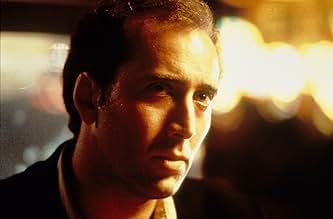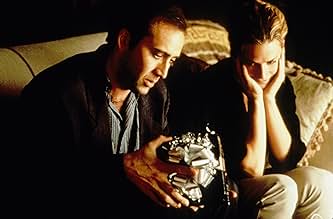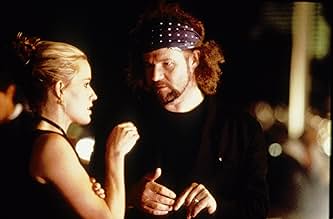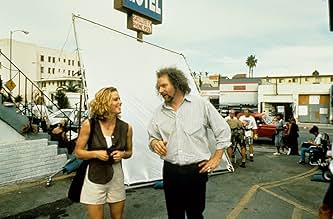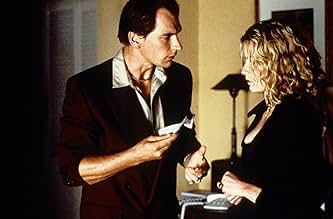Ben Sanderson, un scénariste hollywoodien qui a tout perdu à cause de son alcoolisme, arrive à Las Vegas pour picoler jusqu'à ce que mort s'ensuive. Là, il rencontre et forme un pacte d'amit... Tout lireBen Sanderson, un scénariste hollywoodien qui a tout perdu à cause de son alcoolisme, arrive à Las Vegas pour picoler jusqu'à ce que mort s'ensuive. Là, il rencontre et forme un pacte d'amitié et de non-ingérence délicat avec la prostituée Sera.Ben Sanderson, un scénariste hollywoodien qui a tout perdu à cause de son alcoolisme, arrive à Las Vegas pour picoler jusqu'à ce que mort s'ensuive. Là, il rencontre et forme un pacte d'amitié et de non-ingérence délicat avec la prostituée Sera.
- A remporté 1 oscar
- 32 victoires et 30 nominations au total
- Man at Strip Bar
- (as Al Henderson)
Avis en vedette
Mike Figgis's film is about a Hollywood screenwriter named Ben who loses everything thanks to his alcoholism. He decides to go to Las Vegas to literally drink himself to death and that's where he meets a prostitute, Sera. They form a relationship despite their issues and each realize they form a special bond with each other.
The acting is very good. Nic Cage does a career role and his portrayal of an alcoholic is very realistic and disturbing. I'm perturbed on how much alcohol he drank in the film. Elizabeth Shue does very well as Sera and we are able to feel her pain despite her profession.
Overall, this is a very surreal and realistic drama that focuses mightily on characterization. I don't like what each person does, but somehow the movie makes me feel bad for them and root for good things to happen to our main characters. Also, I really liked the look and the feel of the film. It gives out a more realistic feeling. Thanks to the raw, gritty, and powerful performances, this movie works on a high level. I rate this film 9/10.
**** (out of 4)
Depressing account of a man (Nicholas Cage) who goes to Las Vegas to drink himself to death and once there he strikes up a relationship with a prostitute (Elisabeth Shue). Going back and watching this film after so many years had a lot of things going through my mind. Such as the first time I watched this it was in the theater as the second part of a double feature with DEAD MAN WALKING. Talk about a depressing four hours in the theater. The second thing it reminded me of was what a terrific actor Cage was and how at the time many people were calling him one of the greatest of his generation. I bring this up considering the type of films Cage is currently doing. LEAVING LAS VEGAS is without question a very dark and depressing film and it always amuses me that people attacked the picture for this. I mean, there are several films each year that shows the fun side of drinking so I always find it strange that so many could object to a film showing the ugly side. I can understand people not wanting to sit through a nearly two-hour suicide movie but at the same time those who can stomach the story are going to be shown one of the best performances from this era. Cage is simply marvelous as the alcoholic who goes on a death wish for reasons we're not fully told. It's funny but the screenplay really doesn't give us much insight to either character other than both are troubled, alone and find some sort of comfort with each other. This love story between the two certainly isn't all that casual or romantic but it's quite unique in its own way. The way Cage controls this character, his various emotions and the physical nature of his body falling apart are simply amazing to watch. It really reminds one of how great he can be when the material is right. Shue also turns in the best performance of her career and you can really see the pain in her eyes as this man she loves is slowly dying. Julian Sands is also quite effective in his few scenes. Director Mike Figgis does an extremely good job with the material but a lot of credit also needs to go towards his film score. LEAVING LAS VEGAS isn't a very pretty movie to watch but then again, why would anyone expect alcoholism to be pretty?
As in the ancient tale, love challenges the inevitability of death, although, in the case of LLV, roles are upended and sometimes blurred, and Orphean references are either thinly disguised, or non-specific to the point of being thoroughly sublimated. Academic, to be sure, but completely acceptable as long as LLV can sustain itself and remain engaging. And it surely does, thanks to Figgis' intelligent script and direction, Cage's role as a down-and-out writer and his protracted self-destruction, and Shue's portrayal of a lonely hooker, lifting that old bromide beyond what could have been routine, to a level not seen since Jane Fonda's character in Klute. Excellent performances all around.
With all that said, this film is not for everyone (in particular those who only respond to gratuitous sex, car chases, and mindless pyrotechnics). The lurid depictions of despair, self-loathing, and violence could put off even the most hardened social worker. In my mind's eye, I could see psychiatrists amongst the theater audiences, furiously jotting down their observations. Understandable; the two principal characters are, in the common parlance, screwed up. One cannot cope with failure, so decides to opt out, while the other does cope, but only barely, existing along the ragged edges of what passes for society in Nevada Hell. These details, though, tend to outline and, indeed, strengthen the true heart of this film: Sacrifice and Unconditional Love.
If this film is not for everyone, then who is it for? Those with real life experience and the maturity gained thereby. Those with strong emotional constitutions. Anyone appreciative of impassioned performances. Freudians. Alcoholics, recovering and otherwise. Pimps. Priests. Classicists. Petty whiners in need of perspective. And, more than anyone else, couples who plan on breaking up. In sickness and in health, 'til death do us part. 9.5 out of 10.
Nicholas Cage is Ben, a man who has lost his wife and child, throws his job away, and takes all of his remaining money to buy as much liquor as possible and "drink himself to death" in the city of Las Vegas. He has given up all hope, with no wish to live, but for one reason or another, wants a companion to share in his misery, but not try to save him. He finds this companion in a hooker, Sera, played by Elizabeth Shue. They immediately form a strong relationship based on one night of talking about their lives. Sera in particular quickly grows attached to Ben, for no other reason than she has been alone her whole life and wants nothing more than to feel that want and need by someone.
Cage won his first Oscar for his role as Ben, and how deserved it was. He was astounding, perfection, down to every single tick, the volume of his voice, the pain and tragedy buried in his eyes. I could not believe the extent of his role, the dedication and time he invested in bringing this character to life. Same goes for Elizabeth Shue, who with a simple glance at a person, she reveals her entire self, and no one even dares to notice except for Ben. This neediness is apparent, she wants to hold onto this relationship so badly, yet what makes their relationship work is total and complete acceptance of their respective decisions. He will not tell her to stop being a hooker, and she in return can never ask him to stop drinking. And it is in that factor that makes this film worth watching. To be totally accepted by those around them, to open themselves up to such an extreme.
Leaving Las Vegas is a sobering film about connections, loneliness, acceptance, and a small little island of hope that is Ben and Sera. They are two good people, depicted in a world full of sorrows and misdeeds, who latch onto each other and never let go. They were nothing but ghosts, till that chance encounter, and became each others worlds. Cage and Shue bring these good people to life in such an extraordinary way, making Leaving Las Vegas a film to be treasured and remembered for years to come. I highly recommend this film.
Based around the semi-autobiographical novel by John O'Brien, an alcoholic who committed suicide before the film made it to the screen, this is a sad, dark and deeply upsetting picture. Sanderson and his plight has no motive, we are not fed reasons for his nihilistic behaviour. We find him at the beginning of the film joyously hurtling thru a liquor market isle, promptly filling his shopping cart with bottles of liquor. From here on in we know that this is no ordinary film about an alcoholic trying to get off the booze, we are on a train to Bleakville, stops at Love and Liberation seem a very long way away.
Enter Sera, the sweet and wholesome prostitute, who having escaped the abusive and borderline psycho pimp, Yuri, is herself in need of liberation. But can she carry the burden of both as this unlikely and almost certainly doomed romance starts to become significant? Nicholas Cage as Sanderson is terrific, very compelling, realistic and segueing from zany wired comedy to the desolation of Sanderson's death wish descent within a heart beat. Elisabeth Shue as Sera is also incredibly potent, if perhaps guilty of looking too pristine, and prompting questions of why she would be drawn to Ben's world anyway?
Shue none the less works her socks off to make Sera sensitive and believable. Directed by Mike Figgis, who shot it beautifully in Super 16 film, the film won a Best Actor Academy Award for Cage, and garnered nominations for Best Actress {Shue} & Best Director and Best Adapted Screenplay {both Figgis}. Massively popular and praised on release, it has lost none of the impact that it had back then. 8/10
Le saviez-vous
- AnecdotesAuthor John O'Brien, on whose novel this movie is based, committed suicide two weeks after the movie went into production. Director Mike Figgis contemplated abandoning the project, but decided the film would make a good memorial for O'Brien.
- GaffesYuri is supposed to be swearing in Latvian on the phone. In fact, he speaks gibberish.
- Citations
Ben Sanderson: I don't know if I started drinking 'cause my wife left me or my wife left me 'cause I started drinking, but fuck it anyway.
- Générique farfeluThe opening credits do not appear until fifteen minutes into the film.
- Autres versionsLaserDisc version is unrated and contains more sexually explicit footage. First pressings of the VHS versions also contained this footage but later pressings did not. The Unrated Edition has also been released on DVD and Blu-ray and runs 112 min.
Meilleurs choix
Everything New on Prime Video in July
Everything New on Prime Video in July
- How long is Leaving Las Vegas?Propulsé par Alexa
- What does Ben get told by a waitress at the casino (around 1:04:00), when he's sitting at a gaming table with Sera, which makes him react by flipping the table and screaming?
- What are the differences between the R-Rated and Unrated Version?
Détails
- Date de sortie
- Pays d’origine
- Site officiel
- Langues
- Aussi connu sous le nom de
- Leaving Las Vegas
- Lieux de tournage
- River Palms Resort Casino - 2700 South Casino Drive, Laughlin, Nevada, ÉTATS-UNIS(interiors, as Gold River Casino and Resort)
- sociétés de production
- Consultez plus de crédits d'entreprise sur IMDbPro
Box-office
- Budget
- 3 600 000 $ US (estimation)
- Brut – États-Unis et Canada
- 32 029 928 $ US
- Fin de semaine d'ouverture – États-Unis et Canada
- 70 864 $ US
- 29 oct. 1995
- Brut – à l'échelle mondiale
- 32 029 928 $ US
- Durée1 heure 51 minutes
- Couleur
- Mixage
- Rapport de forme
- 1.66 : 1
Contribuer à cette page



